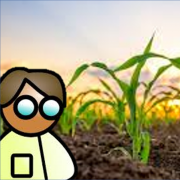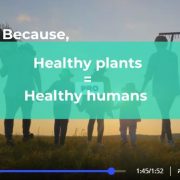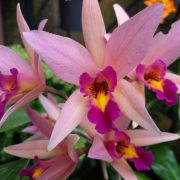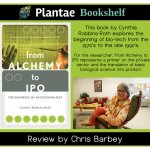Highlights of the 2017-2018 ASPB Conviron Scholars Program
- Career Planning
- Writing and Communications
- Leadership
- Effective Presentations
Within each theme, the participants read collections of articles, attended webinars, and completed assignments within a private Plantae Network. The assignments required the scholars to learn new skills in writing, designing, presenting, and communicating and to bring creative ideas into the motivational environment.
For the 2017 program, a total of 21 students were chosen to participate in program from around the world, and 20 students graduated from the program. We have asked six of them to talk about their experiences.
Introduction to the program:
Here are a few highlights:
Elizabeth Feldeverd, a MS student at the University of Hawaii at Manoa, Department of Molecular Biology and Bioengineering, researches the role of protein disulphide isomerase (PDI) in Arabidopsis thaliana.
She was mentored by Dr Jill Deikman from Monsanto, Saint Louis.
“Not only has she provided specific feedback on my CV, she has provided insight into industry and academic research. Jill and I are still in touch and have regular mentoring sessions scheduled.”
As part of the scholarship, she interviewed Dr. Kent Kobayashi at UH Manoa, written a blog article titled “Glow and Behold” about how to use fluorescent proteins to determine where proteins localize within cells. She also created a board game called “Inflorescence” that combines principles of flower development and protein folding.
“I think the program being “virtual”, i.e. hosted online, made it possible to connect and collaborate with people whom I otherwise would not. It’s been a unique opportunity to network with peers and mentors across a spectrum of plant science roles. I’m inspired by the work others shared and will take away from the program new ideas and projects.”
Lucas Vanhaelewyn, is a PhD student at Ghent University in Belgium and mentored by Dr Jill Deikman of Monsanto, Saint Louis. He researches the morphological effects of ultraviolet-B light on plants in controlled laboratory conditions.
He recorded his 12-minute presentation on his work (link). He organized an outreach event at the Ghent Light Festival about how a plant’s inflorescence stem bends to different wavelengths of the light spectra. About 60.000 people visited the University exhibitions and they have reached 7-10,000 people with their exhibition!
“The program provides a large degree of freedom and pushes you to think out of the box. The program is largely designed to provide a set of information, but in addition, it gives you insights on how to address people and it connects you with new and very interesting people which you might actually never meet without this program. This program is enabling you to push your limits in the way you find it most valuable.”
As part of his informational interview, he had the opportunity to Prof. Marc Van Montagu, a pioneer in plant molecular biology. He is well known for the discovery of the Ti plasmid (with J. Schell) and the inventor of the Agrobacterium tumefaciens transformation technology which is now used globally as a method to produce genetically engineered plants.
“There are some strict deadlines during the program which will push you to achieve things which you would not have found time or courage for otherwise.”
Virginia Markham is a PhD student at UC Berkeley, Department of Energy Join Genome Institute. Her research focuses on the evolution and gene fate in a polyploid grass, which is a model for biofuel and cereal crops.
Her writing assignment and 12 minute presentation about ‘First the friction, then the honeymoon: polyploid gene expression on two timescales‘, discussed her research. She was mentored by Prof Leeann Thornton, from The College of New Jersey:
“She introduced me to teaching at PUIs, and was extremely helpful in telling me what the job was like and what concrete steps I could be taking now to get there. I was very inspired by our interactions and now this career path is my ‘plan A’.”
She interviewed Rachel Mackelprang, a professor at CSU Northridge about teaching careers. For the independent project, she created an infographic showing which crop plants are available commercially as GM varieties, demystifying GMOs for the public.
She is part of the CLEAR (Communication, Literacy, and Education in Agricultural Research) program, which brings a booth to local farmer’s markets (Berkeley and Oakland) to disseminate science to the public by talking about various topics such as DNA, fungi, women in science, food waste etc.
“The webinars were the glue in the program experience, joining together all the activities and outlining a seamless narrative for the program. The speakers were fantastic, the students asked great questions, and the technology worked perfectly every time.”
Alex Rajewski, a PhD student at the University of California, Riverside, works on gene function changes that have occurred along with the evolutionary transition from dry to fleshy fruits.
He was mentored by Dr. Jill Deikman of Monsanto, Saint Louis, and found it extremely interesting to hear about transitioning from academic to industry jobs. He created an infographic about plant tissue culture.
“It’s such a fun technique that is a blend of old school and new school. It’s been integral to both of my degrees and I just had to spread the gospel.”
He volunteered at the UC Riverside’s Plant Discovery Day, teaching children how flowers develop into edible fruits by dissecting alstroemeria flowers to find the male and female parts of the flower, learn about pollination, and then categorize foods into fruits versus vegetables.
“The personal attention that I got from later career scientists made it the most special. It’s easy to assemble a group of students, but to marshal of a group of established professionals that are interested in bettering students is much more difficult.”
“It’s such a fun technique that is a blend of old school and new school. It’s been integral to both of my degrees and I just had to spread the gospel.”
He volunteered at the UC Riverside’s Plant Discovery Day, teaching children how flowers develop into edible fruits by dissecting alstroemeria flowers to find the male and female parts of the flower, learn about pollination, and then categorize foods into fruits versus vegetables.
Xinyu Fu, a PhD candidate at Iowa State University, focusing on the structure and dynamics of the acetyl-CoA metabolic networks in plants.
Her mentor was Prof Judy Callis at the University of California-Davis and she was encouraged to find something that truly interests her while looking for post-doc positions.
“I really appreciate the Conviron Scholar Program connecting me with Dr. Callis and also appreciate her time and efforts to mentor me.”
She interviewed Dr. Bo Xie, a Technology Marketing Associate at Iowa State University. For her educational event, she worked with Dr. Mark Gleason at Iowa State University for several months. Using a crop protection scenario with characters of a field manager, a project manager, an undergraduate, and a professor, they have created undergraduate teaching material based on Problem-Based Learning.
Her blog was about “Chemical Languages: The Way Plants Talk to Themselves and Others” and as a project, she created a beautifully designed a 16-minute video about the health and nutritional effects of plant fats and oils.
“Initially I was planning to make a 5-minute video as editing is quite time-consuming for a beginner like me. As I started, I just had more and more ideas that I wanted to put in the video. […] After assembling all the video clips and audio narration, I showed the draft to people in my lab and many non-science friends, who gave me a lot of feedback to improve my video.”
Beverly Agtuca is a PhD student at the Christopher S. Bond Life Sciences Center at the University of Missouri. Her research involves detecting the metabolic content of single plant cells associated with nitrogen fixation using Laser Ablation – Electrospray Ionization Mass Spectrometry (LAESI-MS).
Her mentor was Dr. Aaron Wyman, an associate professor at the Spring Arbor University in Spring Arbor MI.
“We concluded that I would like to apply for a job at a small industry for a few years and then focus on teaching at small colleges with a high emphasis on education and low on research. I got so much support from Dr. Wyman […].”
She interviewed Dr. Cintia Riberio from Monsanto who is in the Emerging Leaders Program, discussing the different roles to work in the industry/company side. She has written an abstract and recorded her presentation on her fascinating research. For her project, she developed an inquiry-based classroom activity called “Garden in a Glove”.
“I see happiness and excitement on children’s faces of all ages when I do scientific demonstrations as a volunteer in the past. However, for this independent project, I wanted to emphasize a demonstration of ‘plant growth and development’, for the children to understand and have fun with plant biology.”

Keep your eye out on Plantae – we will be featuring every scholar, their work, and feedback about their experience from the ASPB Conviron Scholars Program!

/preview.png)


/preview.png)






Leave a Reply
Want to join the discussion?Feel free to contribute!